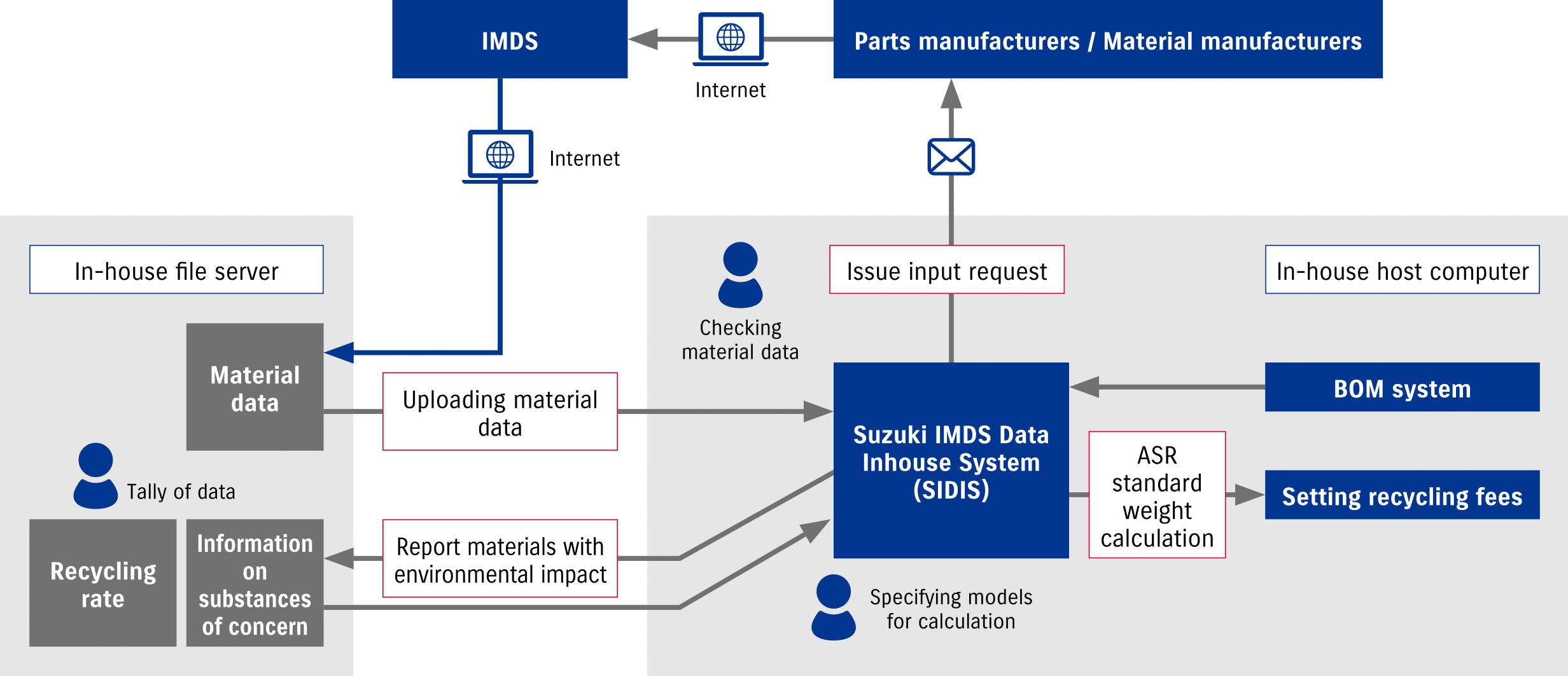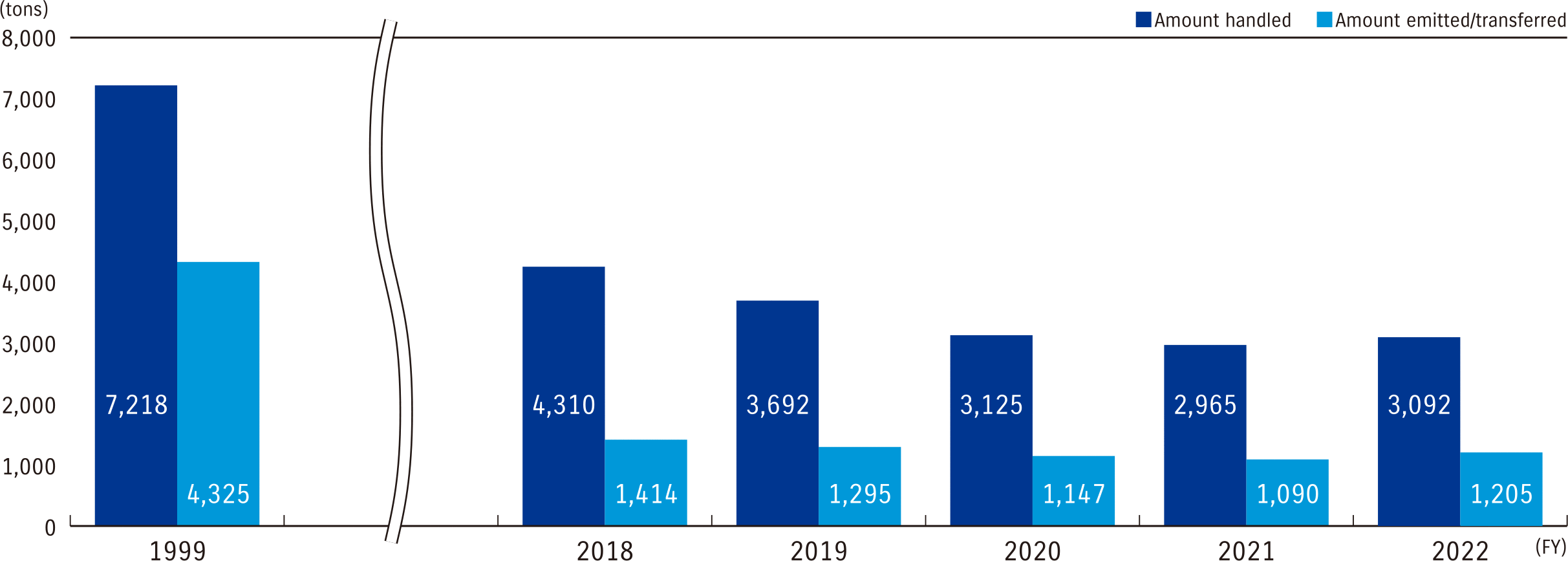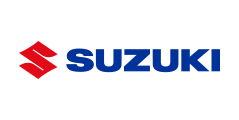Efforts in product use
Design and development efforts
Promotion of green procurement
We have established the Suzuki Green Procurement Guideline that indicates our policy to purchase eco-friendly parts and materials from suppliers who are making ambitious efforts in environment conservation and agree to our guideline by submitting the Suzuki Green Procurement Promotion Agreement to us.
We partially revised this guideline in October 2013 to clarify the matter related to establishment of a substance of concern management system at partner companies, and prepared/ added the self-check sheet for the control system. (We have been requesting new and existing suppliers to submit check sheets thereafter. More than 93% of suppliers of production parts have attained outside certifications including ISO 14001.) Also, we work alongside our suppliers to conform to not only existing regulations, such as the European ELV Directive and European Regulation concerning the Registration, Evaluation, Authorization and Restriction of Chemicals (REACH), but also various future environmental laws and regulations.
Also, we request business partners to work on reducing environmental load such as (1) CO2 emissions, (2) VOC emissions, (3) the amount of waste generated, and (4) water usage, as well as (5) to promote energy saving in their business activities.
* Suzuki Green Procurement Guideline:
https://www.globalsuzuki.com/corporate/environmental/green_policy/pdf/suzukiGreenGuideline.pdf
Management of substances of concern
In recent years, new regulations on substances of concern have been successively increasing on a global basis. Suzuki provides products to customers worldwide and therefore must respond quickly to rapid changes. With this in mind, in 2003 Suzuki began utilizing the International Material Data System (IMDS) for the automobile industry. In addition, Suzuki has built an in-house substance of concern management system (SIDIS, or Suzuki IMDS Data Inhouse System), through which it efficiently gathers information about materials and chemicals used in each part. We use this information to calculate the recyclability rate, which is a requirement to receive type approval of motor vehicles in Europe, and manage various regulated substances as part of green procurement. In FY2022, Suzuki provided customers with 34 new models that included automobiles, motorcycles, and outboard motors upon confirming that these products complied with regulations for substances of concern. We are also preparing for new regulations being considered for the future, while studying their details. With expectations of a further tightening of regulations, we will strictly comply with these regulations and strive to provide customers with products having low environmental impact.
■ In-house substance of concern management system

Promotion of establishment of the substance of concern management system in overseas bases
[Green Procurement Guideline operational audit]
As a pillar for managing substances of concern, we formulated the Suzuki Green Procurement Guideline and started its operation sequentially at major overseas production bases from 2011 onward, and conduct an audit aimed at confirming its operation.
[Audit for implementation of Asbestos Control Rules]
The use of asbestos is thoroughly prohibited in Suzuki’s technical standards. We newly established the Asbestos Control Rules to enforce prohibition of use particularly for parts delivered to overseas plants. The rules require complete prohibition of the use of asbestos by our business partners, and implementing periodic education to relevant parties within the Company. The implementation of these requirements is audited by Suzuki.
<FY2022 results>
- Web-based audits (two sites)
-
- Changzhou Haojue Suzuki Motorcycle Co., Ltd.
- Jiangmen Dachangjiang Group Co., Ltd.
- Business trip (on-site) audits (three sites)
-
- Maruti Suzuki India Limited
- Suzuki Motorcycle India Private Limited
- Suzuki Motor Gujarat Private Limited
In FY2022, we conducted web-based audits due to the voluntary restraint on overseas travel, continuing on from the previous year, in response to the COVID-19 pandemic. After the restrictions on travel were lifted, we switched to on-site audits with an emphasis on on-the-job training for staff at overseas offices on how to provide guidance to suppliers.
Promotion of establishment of the substance of concern management system at business partners
Information about substances of concern in the automobile industry is collected as IMDS data in cooperation with business partners. However, as there have been IMDS data defects in the past, we conduct online briefing sessions about developments in the regulation of substances of concern, including requests for business partners to input accurate IMDS data, as well as audits and guidance concerning strict adherence to Green Procurement Guidelines, and promote the establishment of a substance of concern management system throughout the entire supply chain.
<FY2022 results>
Companies that received an audit and guidance: 15
Conformance to regulations concerning chemical substances
We have promoted the shift in products to materials that do not contain four phthalate-type plasticizer substances (DEHP, DBP, BBP, and DIBP) specified as a limited substance (prohibition) in REACH (EU) in cooperation with our business partners, and completed the switch to materials not containing these substances for motorcycle and outboard motors as of July 2020. We are currently promoting a shift to materials that do not contain these substances for our automobiles.
We have also begun the registration of SCIP data* as a result of the Waste Framework Directive (EU). Suzuki is utilizing IMDS data to gradually register data concerning its products that are sold within the EU.
Going forward, we will regulate procedures to comply with regulations to ensure the switchover of regulated substances, and promote strengthening post-mass production management, including sampling analysis and confirmation of parts that do not contain these substances.
* SCIP (Substances of Concern In articles as such or in complex objects (Products))
A framework intended to make information about chemical substances included in recycled materials more accessible in an aim to transition to a circular economy. This helps to improve the safe use of recycled materials by, for example, removing the hazardous substances contained in the recycled material rather than using the material in its current state.
Efforts in business activities
Efforts in production
Efforts to reduce chemical substances
●Purchasing new substances
Before our domestic offices adopt new materials such as paint, oil, and detergents, the environmental management department examines the toxicity of chemical substances contained in the materials and the planned amount of use, as well as how to use and store them, and determines whether or not they are allowed to be used. The data collected through the research are managed as Pollutant Release and Transfer Register (PRTR) data, which will be used to reduce the volume of those materials. Also, for raw materials, our SDS* is kept up-to-date to provide the latest chemical data.
* SDS (Safety Data Sheet): A sheet listing the names, physical chemistry behavior, hazards, and caution for handling, etc. of chemical substances.
● PRTR (Pollutant Release and Transfer Register) target substances
To reduce environmental load, we are working to reduce PRTR target substances. The amount of release and transfer was 1,205 tons in FY2022.
■ Amount of PRTR target substances that are handled, emitted, and transferred

[Scope of aggregation]
Head office, Iwata Plant, Kosai Plant, Osuka Plant, Sagara Plant (including the Sagara Proving Grounds), Hamamatsu Plant, former Takatsuka Plant (until July 2018), former Toyokawa Plant (until July 2018), Motorcycle Technical Center (Ryuyo Proving Grounds), Marine Technical Center, and Shimokawa Proving Grounds (from FY2020)
Plan for early disposal of PCB
(Polychlorinated Biphenyl)
The Act on Special Measures concerning Promotion of Proper Treatment of PCB Wastes requires appropriate disposal of PCB waste contained in old capacitors, etc. by March 31, 2027. Suzuki has set an in-house target to complete the disposal of these materials by March 31, 2025 and is working to achieve this goal. At Suzuki’s domestic plants, PCB waste equivalent to 2,018 total units of vehicles has been disposed of as of March 31, 2023.

 Japan
Japan
